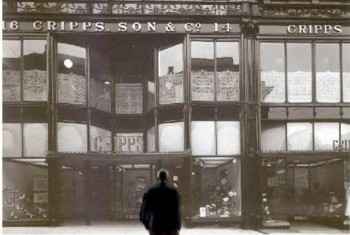

 |
Time is the perfect murderer. Every day it indiscriminately kills around 40,000 individuals worldwide. Rich and poor, black and white; all succumb to time's insidious erosion of their bodies and minds, and it seems as if there isn't a thing we can do to stop its merciless onslaught. People often talk of killing time, but ironically it's the other way round.
If only it were possible to hinder the passage of time; then we could extend our transient lifespans. The Roman writer Horace succinctly summed up our mortal predicament in a sentence over a thousand years ago: "Life's short span forbids us embarking on far-reaching hopes."
To stop the clock and live indefinitely has been a recurring dream throughout the history of mankind, but will the fantasy ever become a reality? It is the author's belief that the flow of time can be controlled, and that, incredible as it seems, various individuals have inadvertently moved backwards and forwards through the 'fourth dimension' the official scientific description of time. These timewalkers will be looked at in some detail later, but first let us take a cursory look at the nature of time from a scientific viewpoint.
What we call time is still something of a mystery. Until the German mathematical physicist Albert Einstein (1879-1955) came along, scientists regarded time as an absolute, universal unchanging something that flowed steadily on in one direction like a might river; from the past to the future. Einstein proved that this was simply not the case at all. Long before experiments verified that his reasoning was correct, Einstein told the sceptical scientific community of his day that time was elastic, reversible, and actually ran at different rates in different areas of the universe, which made a mockery of the traditional notions of time laid down by the English scientist and mathematician Sir Isaac Newton (1642-1727). Einstein said something revolutionary that seemed nonsensical initially; that objects which are moving age slower compared to stationary objects. As an example, imagine there are identical twins. One of them climbs aboard a rocket which takes off from Earth and begins a five-year space voyage at a speed very close to light's velocity (which is 186,281 miles per second). When the astronaut returns to Earth, he would find that his terrestrial twin is now 50 years older than him!
Einstein's incredible theory of time-dilation has now been proved in many ways. If we had two highly-accurate atomic clocks, and we placed one at an airport and one in Concorde and flew it to New York and back, we would find that the readouts from the two clocks would be different when they were subsequently compared, because the clock on Concorde would have ticked slower than the stationary clock in the airport. Time-dilation has also been observed in sub-atomic particle such as the muon, which decays on average after 2.2 microseconds. These particles are created when cosmic rays enter the upper atmosphere, and are so short-lived, they ought not to persist for long enough to reach the Earth's surface, but they do, because they are moving so fast that their time-scale, relative to ours, is slowed down.
If you are still not convinced that there is more to time than meets the eye, you should go out on a cloudless, moonless night and look up at the stars, and you will be participating in a type of time-travel yourself, because you will be seeing the stars as they were many years ago. If you see a faint fuzzy patch of luminosity to the upper left of the Pegasus constellation, you will be looking at the Andromeda Galaxy, which is the nearest galaxy to ours. But you will not be seeing this galaxy as it is, but as it was 2.2 million years ago, because it is so far away, the light from it takes that long to reach your eyes here on Earth. In other words, you will be looking back into the remote past when you look up into the sky. Astronomers recently announced that a cluster of galaxies known as Abell 2065 had been discovered in the Corona Borealis constellation that were a billion light years away, and that the light from these remote stellar objects had started its journey to their telescopes around the time mankind was (supposedly) beginning to evolve from the primordial sludge on Earth.
The following story is an account of a man who inadvertently strolled into the past early in July 1996 in Liverpool City Centre.

The girl just laughed, shook her head, and walked out again. Frank said the girl looked back and shook her head in disbelief. When he told his wife about the incident, she said that she had not noticed anything strange, but Frank was really adamant that he had not hallucinated the episode.
I gave an account of this strange timeslip on the Billy Butler show, and within minutes, people were ringing me and Billy at Radio City to tell us that in the late 1950s and early 1960s there had been a store called Cripps in the exact location where Dillons Bookshop now stands, and there had also been a firm called Caplan's in existence around the same time. What's more, I also received letters and phone calls from listeners who had also experienced strange things in the part of Bold Street where the policeman stepped into another era. A man who worked on the renovation of the Lyceum building in Bold Street said his digital watch went backwards for two hours one day, and on another occasion, he put down his safety helmet, and when he looked down literally seconds later, it had vanished, yet no one was within fifty feet of him.
A Radio City listener named Emma Black sent me a fascinating cutting from a 1970s magazine concerning a timeslip which apparently allowed a telephone conversation to take place between two people spaced thirty years apart. The following summary of this strange story may seem like an episode of The Twilight Zone, but I have heard of three other similar cases. An old woman named Alma Bristow of Bidston, Birkenhead, tried to phone her sister (who had recently lost her husband) in Frodsham, Cheshire. Alma always had difficulty dialling numbers on the old British Telecom analogue telephone because she had stabbing arthritis in her fingers. Alma had evidently misdialled her sister's number, as a man's voice answered. The man said "Captain Hamilton."
Alma asked if her sister was there, but 'Captain' Hamilton replied haughtily, "This is not a civilian number. Who are you?"
Alma gave her name, and as she did, she heard a sound at the other end of the phone that she hadn't heard since she was a young woman: an air raid siren kicking. "Sound like World War Two there." Alma joked.
There was a pause, then Captain Hamilton replied, "What are you talking about?"
"The air-raid siren. Sounds like the war's still on." Alma said, about to hang up.
"Of course the war's still on. Where did you get my number from?" said Hamilton.
"The war ended years ago, in 1945." said Alma, suspecting she was a victim of the Candid Camera Show.
Captain Hamilton was heard to whisper to an associate, then resumed the surreal conversation. "It isn't 1945 yet. If we trace you you'll be thrown into prison for this lark you know? You're wasting valuable time woman."
"Eh? It's 1974. The war's been over for years." Alma retorted, and then she heard the unmistakable rumble of bombing coming over the phone.
"We'll deal with you later don't worry." said Captain Hamilton, and he slammed the phone down. Alma listened eagerly for him to pick up the handset of his telephone, but Hamilton never did. Alma never knew if she had been the victim of an elaborate hoax, or whether she had really had talked with someone in wartime Britain.
The two previous stories about timeslips suggest that the events of the past are still going on somewhere along the fourth dimension. Isn't it ironic how the clock rules all our lives, yet we know virtually nothing about time? Our ignorance regarding the nature of time reminds me of a thought-provoking remark Einstein once made. He said: "What does a fish know about the water in which he swims all his life?"
�Tom Slemen 2001
This story reproduced with permission from Tom Slemen
Visit Tom Slemen's official web-site at http://thomasslemen.tripod.com/
